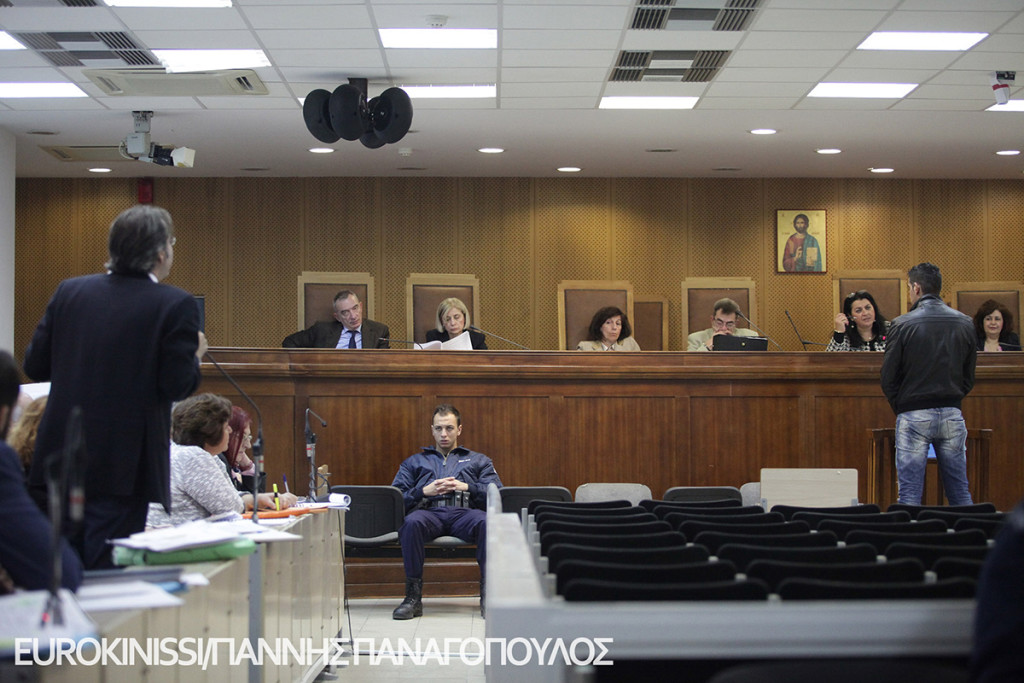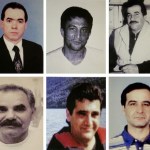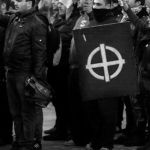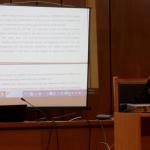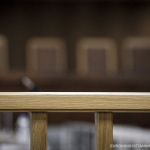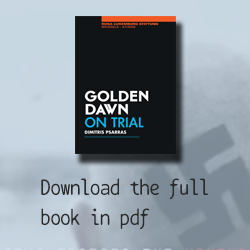27th Hearing, Women’s Section, Korydallos Prison, Athens, 10 November 2015
1. Court access
Hearings remain accessible to members of the public, provided they present their identity cards at the entrance. However, the crowd in the courtroom had thinned. The spaces reserved for journalists are almost always occupied. The malfunctioning microphone identified on the 25th day of the trial had not been repaired.
2. Presence and representation of the defendants
Six (6) defendants were present at the beginning of the hearing. Twenty-nine (29) defendants were listed as absent. The remaining defendants were represented by their counsel.
3. Testimony of police officer Konstantinos Kotsovos
Konstantinos Kotsovos, member of the rapid response unit of the police, was called to the witness stand. His evidence, broadly developed around the questions from the presiding judge, Maria Lepenioti, was as follows:
I am a policeman. I have served in the rapid response unit since 2011. On 17 September 2013 I was working the 21:00–05:30 shift in Piraeus. The patrol car driver and I were somewhere on Petrou Ralli St when, at 00:00, we received an E11 call (a fight among many people) likely involving football hooligans. We got there in five minutes. Meanwhile, we received a second call and were told that an informant at the scene had mentioned a man in black clothes hiding in the ground-floor parking lot beneath an apartment block in a lane parallel to Tsaldari St. The driver left me next to the spot and I walked there to look for the man who was hiding. Four or five colleagues and I looked for him together for about ten minutes. Two of them were from the security police. I found no one. When I got to the scene, I saw lots of people, people from the area, policemen, a man on the ground in the arms of a woman. The police chief, Mr Symeonoglou, and at least another five policemen were there. The police chief ordered us to secure the area, to move the bystanders back and to escort the ambulance. I didn’t take the details of any witnesses as he didn’t tell me to. Later, we were told to look for people involved in the fight. The area had cleared and we were looking for people on motorbikes and dressed in black. Five or six patrol cars searched until 03:30 – I was probably in the area until the end of my shift. Finally, I gave up on finding people who matched the given profile and detained three men who seemed out of place and didn’t have any ID on them.
Following questions from the judge, the witness stated that he didn’t remember giving two statements, as the judge pointed out that his second statement contradicted his first. Moreover, he stated that for reasons of self-defence, even if he had reached the scene in time for the murder, he would not have intervened without the support of a substantial number of his colleagues. He added that if he had got the impression that the people involved were not hostile to the police, he would have said “calm down”; that when an incident involves 50 to 60 people, policemen can only stand back and watch until backup arrives. Responding to his evidence, the judge said: “It’s good for citizens to know what they can expect from you.” The witness proceeded to state that he had never been at a Golden Dawn event and that his knowledge of attacks on foreigners and of assault divisions committing criminal acts on motorbikes is limited to what he saw on television. He added that he knows nothing about uniforms, military formations or of any leader or cell-leader commander or about a local branch in Nikea.
Following questions from the prosecutor, the witness stated that the E11 call did not specify how many people were involved in the incident; that when he arrived he found bystanders of various ages; that he didn’t notice anyone wearing black clothes.
Following questions from the deputy prosecutor, the witness stated that the police chief was likely there because of the murder and that it was unclear who was chasing whom in the ground-floor parking lots.
Once the court has finishing questioning the witness, a member of the public intervened, stating his identity and his profession as a journalist. He asked the court why one of the judges, Andreas Dokos, had never asked a question and spends the entire time looking at his iPad rather than the courtroom. The presiding judge called the court to order and reminded the man that he had no right to interrupt the hearing and to insult the court. The defense counsel protested against the invention by the member of the public, leading the presiding judge to interrupt the proceedings.
4. Cross examination of the witness by the civil counsel
Civil counsel followed to cross examine the witness. Following questions from Andreas Tzelis (for the Fyssas family), it emerged that the witness did not consider it worth mentioning in his daily report that he had spent ten minutes looking for someone hidden in a ground-floor car park; that by individuals from the “known space” he meant Golden Dawners even though he himself saw nothing of the sort, but probably thought so because of the description from police HQ; that the radio signal was good that night; that they usually pick up calls to the Dias motorcycle police but didn’t on that night; that he can’t remember a call referring to men carrying battens, even though, following a further question, he admitted that he might have heard it. He added that he did, eventually, make it to 60 Tsaldari St and that he saw motorcycle policemen on the spot but wasn’t sure because there were other motorbikes parked there. He also stated that he couldn’t remember whether the police chief was in uniform; that he doesn’t know why the Golden Dawn leader assumed political responsibility for the crime, nor does he have any opinion on the matter; that he has never heard the slogan “Blood, Honour, Golden Dawn”.
In response to questions from Violetta Kougiatsou (for Magda Fyssa), the witness stated that though his report is dated 2 October 2013 (fifteen days after the incident), he had written it the day after the murder because the station requires it to be submitted within four days at the latest following the incident. The witness stated that in his report he mentioned the time on the patrol car’s clock, which may have been off by a few minutes. Moreover, he stated that he didn’t see a car parked on the wrong side of the road at the murder scene, even though in a previous statement he said that he had seen it. He said that he detained some individuals because they were lingering on a dark square without any ID.
Responding to questions from Chrysa Papadopoulou (for Irini Fyssa), the witness stated that the calls to the Dias motorcycle police are made on a different frequency and that the patrol car never changed frequency in order to hear the calls made to the motorcycle police, regardless of what his colleague, the driver of the patrol car, said in his own testimony. Moreover, he stated that he received an E11 call (fight), but can’t remember what the code E6 meant. When the counsel read out the call from police HQ to the patrol car that read “E6. Fifty people with clubs outside Koralli”, the witness recalled that a different incident with an E11 code had occurred earlier in Petralona.
In reply to Eleftheria Tompatzoglou (for the Fyssas family), the witness stated that he could not remember whether code E6 means “gathering of people” and that gatherings usually accompany a car accident. Moreover, he stated that he could not remember when it was specified to him that it wasn’t a case of football hooligans wearing black, but of Golden Dawners. He said he didn’t know where the Golden Dawn offices in Piraeus were, even though, as the counsel said, they are 50 meters away from Piraeus police station. He added that he did not know a Ms Popori [a policewoman who is one of the defendants].
During cross-examination by counsel Thanasis Kampagiannis (for the Egyptian fishermen), it emerged that the call referring to the incident before the court was “Ifigenias and P. Tsaldari streets; code E6” and not “Korinthou and Krinis Square; E11”. Moreover, the witness stated that he wasn’t told anything about Golden Dawn members, and insisted that the first call only mentioned hooligans. Moreover, based on the recordings of the call, the witness recognized the caller as Hatziefstratiou, the man who was being chased in the ground-floor parking lot, and not a third party as he had believed until recently. He stated that he did not remember a call concerning a wounded migrant; in response, the counsel referred to the case file, which refers to a call concerning “62 Tsaldari street; a wounded migrant”. Finally, the witness said he has never heard of a mosque being burnt down in [the Piraeus district of] Kaminia.
From the questions posed by Kostas Papadakis (also for the Egyptian fishermen), it emerged that the witness did not know his colleague, Tsolakidis; that he never saw Kourentzis [a policeman] that night because he and Dafos [another policeman] had already arrested the criminal; that the presence of the police chief seemed obvious to him, which is why ne never mentioned it; and that he never participated in an investigation following the incident.
Takis Sapountzakis (for the PAME trade unionists) then cross-examined the witness. It emerged that that witness arrested people after he was ordered to arrest Golden Dawn members; that he had to arrest someone in order to justify his work, even though, as it turned out, he arrested “the opposite” of Golden Dawn. Finally, the witness stated that had all the police officers been at the crime scene at the same time, they could have prevented the murder.
Under questioning from Eleni Zafiriou (also for the PAME members), it emerged that it was the witness himself who interpreted the incident as a fight between hooligans; it was not relayed to him in that way by the station. Moreover, he stated that he has seen assault divisions on television and that they do, indeed, wear particular clothes: white trousers and black shirts. He continued that he doesn’t know any Golden Dawn members, but does know that Ilias Kasidiaris was a Golden Dawn MP and that Nikos Michaloliakos was the party leader. Moreover, he said that the assault divisions were connected to Golden Dawn and that the PAME flyposters in Perama were members of the Communist Party (KKE). At this point, Zafirou attempted to ask the witness about the relationship between Golden Dawn and Kasidiaris, Lagos, Pappas, Pantazis. The question remained unanswered as the defence protested strongly. Specifically, Panagiotis Michalolias (for Nikos Michaloliakos) told Zafirou that she was out of order and asked the presiding judge to forbid any questions regarding defendants whose trial the civil action has not been admitted.
The hearing went into a short recess.
5. Application from the defence regarding the legal standing of the civil action
Reading sections from the indictment, the presiding judge reminded the court that the civil action had been admitted to the section of the trial dealing with the murder of Pavlos Fyssas and in cases involving eighteen defendants charged with further crimes as well as involvement in the criminal organization Golden Dawn. The civil action has not, however, been admitted to the trial of the remaining defendants. The same applies for the four defendants accused of assaulting the PAME members and for the five defendants in the case of the assault on the Egyptian fishermen. She referred to the example of Kyriakos Antonakopoulos, one of those charged with the assault on the PAME trade unionists. She read out from page 865 of the indictment: “In Athens, from the year 1980 onwards, together with his codefendants, Nikolaos Michaloliakos, Ilias Kasidiaris, Lagos, Pappas, Boukouras etc, [Antonakopoulos] became a member of and participant in the criminal organization Golden Dawn.” She also referred to the section in the indictment referring to the hierarchical structure of the organization, citing Nikos Michaloliakos as its sole leader. The presiding judge announced that civil counsels can refer only to the first part (the matter of membership of a criminal organization). However, civil counsel is barred from asking questions concerning defendants who are charged with membership and participation of the criminal organisation, but who were not charged with the crimes in cases that the civil action has been admitted.
Michalolias accused the civil action of framing questions in such a way as to take the authority of the presiding judge for themselves. Dimitris Papadellis (for Ilias Kasidiaris) spoke of a circuitous violation of article 171 of the code of civil procedure (which provides for the baring of a civil action in the event that counsels intervene in the proceedings illegally).
Counsels for the civil action then responded: Thodoris Theodoropoulos (for the PAME members) said that the defence keeps returning to an issue that was settled when the court decided to admit the civil action to cases pertaining to membership of a criminal organization. He referred to the first paragraph of the indictment regarding the defendants charged with membership pr and directing a criminal organization. Moreover, he raised the fact that a criminal organization requires three members in order to qualify as such; he wondered how he could possibly demonstrate the existence of such an organization if he is only permitted to ask questions about one member.
Eleni Zafiriou (also for the PAME members) protested that the court is treating the issue as though it were dealing with two different organizations, where the second is made up certain elements that cannot be presented in court. She clarified that the issue at hand is a single criminal organization in which all of the defendants acted together. Specifically, she said: “Our colleagues shouldn’t worry; we won’t be seeking compensation from the [organization’s] leadership. The Greek people will seek compensation, not financial but ethical.”
Kostas Papadakis (for the Egyptian fishermen) insisted that it is within the rights of the civil action to prove [the charges] and part of their duty to explore whether defendants were involved in the criminal organization. He stated that such investigations are essential in order to ensure a sound verdict. Finally, he added that the civil counsel did not ask the question in relation to the criminal responsibility of Kasidiaris, Boukouras, etc., but rather to investigate whether they acted together with the other defendants.
Thanasis Kampagiannis (also for the Egyptian fishermen) added that the defence’s interventions violate the court’s decision to admit the civil action and that the court cannot forbid civil counsels from highlighting objective facts such as the time and place of the criminal organization’s activities, especially given they had not asked any of the witnesses about details regarding the leadership of the criminal organization.
Finally, Chrysa Papadopoulou (for Irini Fyssa) said that the court should not confuse the active admission of the civil action to certain parts of the trial with passive admission in other parts. The fact that civil action was not admitted to make a case against specific defendants does not mean their names and their role in the organization cannot be raised in connection with the defendants in cases where the civil action has been admitted.
6. Strike
The presiding judge announced her decision not to accept the counsels’ wish to participate in the general strike on 12 November; she said that the court would not participate in the strike and that any counsel wishing to do so would have to appear in court on that day to announce their absence.
At this point, the court adjourned until 12 November at 09:00.

